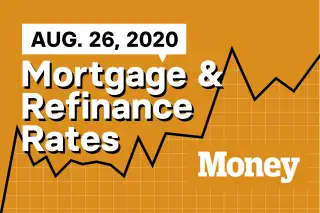Here Are Today's Best Mortgage & Refinance Rates for August 26, 2020

Borrowers with 700 credit scores were quoted an average rate of 3.607% to secure a 30-year fixed-rate purchase mortgage on Tuesday, according to Money's survey of over 8,000 lenders across the country. At this credit score, roughly the national average, the average rate for a 30-year refinance was 4.604%. Our rates include mortgage points and are for borrowers putting 20% down.
| 30-year fixed-rate purchase mortgage |
| 3.607% |
| Rates of August 25, 2020 |
Borrowers in Michigan were quoted the lowest rates on Tuesday—at 3.378%. Those in Indiana saw the highest average rate at 3.823%. The borrowers with the best credit scores, 740 and above, were quoted rates averaging 3.174%, while those with credit of 640 or below were given rates of 4.938%—a 1.764 percentage point spread.
You may be able to negotiate a better rate if you shop around or if you have other accounts with the lender. Currently, some banks are hiking up advertised rates to keep demand in check, so you may be offered a lower rate if you reach out directly.
Freddie Mac’s widely quoted Primary Mortgage Market Survey put rates at 2.99% with 0.8 discount points paid for the week ending August 20. The mortgage purchaser’s weekly survey reflects borrowers who put 20% down on conforming loans and have excellent credit.
Refinance rates today
Our survey shows that the best rate for a 30-year refinance for someone with a 740 credit score was 3.833% on Tuesday. Last August, the average mortgage rate (including fees) was 4.005%.
| 30-year fixed-rate mortgage refinance |
| 3.833% |
| Rates of August 25, 2020 |
A homeowner with a $200,000 mortgage balance currently paying 4.005% on a 30-year loan could potentially cut their monthly payment from $1,013 to $842 by financing at today’s lower rates. To determine if now is a good time for you to refinance, you will also want to consider the closing fees you paid on your current mortgage, how much your new lender is charging and how long you have left on your current mortgage. (Our picks for the best lenders for refinancing are here.)
What else is happening in the housing market right now?
The news of today, that could impact your home tomorrow.
Mortgage loan applications were down across the board this week, according to the Mortgage Bankers Association's Weekly Mortgage Applications Survey. Overall, the combined number of application were down 6.5% for the week ending August 21 compared to the previous week.
Refinance loans took the biggest hit, down 10% from the previous week. The refinance share of mortgage activity decreased to 62.6%. Purchase loans were down a seasonally unadjusted 2% (on a seasonally adjusted basis, purchase loans increased 0.4%).
"The home purchase market remains a bright spot for the overall economy. Purchase applications were essentially unchanged but were 33% higher than a year ago - the 14th straight week of year-over-year gains. Mortgage rates at record lows and households looking for more space are driving this summer's surge in demand," said Joel Kan, associate vice president of economic and industry forecasting for the MBA.
Meanwhile, Freddie Mac and Fannie Mae announced yesterday the postponement of the implementation of the Adverse Market Refinance Fee, originally set to begin on September 1. The fee is now set to begin on December 1. The industry applauded the decision.
"Moving the date to Dec. 1 will help ensure that more consumers enjoy the benefits of historically low interest rates," said Chuck Fowke, chairman of the National Association of Home Builders. "We recognize the challenges faced by the GSE's during the COVID pandemic. NAHB looks forward to working with the White House, FHFA, and the GSE's in the effort to finance and build quality housing for American families during this difficult time."
Bob Broeksmit, president and CEO of the MBA, added that “we welcome today’s announcement from the FHFA amending the recently announced Adverse Market Refinance Fee from Fannie Mae and Freddie Mac. Extending the effective date will permit lenders to close refinance loans that are in their pipelines and honor the rate lock commitments they made to their borrowers, ensuring that economic relief in the form of record low interest rates will continue to flow to consumers."
The fee was announced last week as a means for Fannie Mae and Freddie Mac to offset some of the expected losses from loan defaults resulting from the economic disruption of the COVID pandemic. Industry leaders had estimated the fee would add $1,400 to the cost of refinancing a loan.
Mortgage Quote of the Week
Darlene Schror, Redfin listing agent in New Jersey, on how the pandemic has changed what people look for in a home:
The houses that surprise me the most are the ones out in the boondocks, so far from the cities. You've got to drive to everything; there's nothing to walk to. Before the pandemic, nobody wanted that stuff. Homes listed in those areas would sit on the market for a long time. Now they are hot."
Bottom line:
5 Ways Your Finances Instantly Change When You Buy a House
Is Now a Good Time to Refinance My Mortgage? A Decision-Making Guide